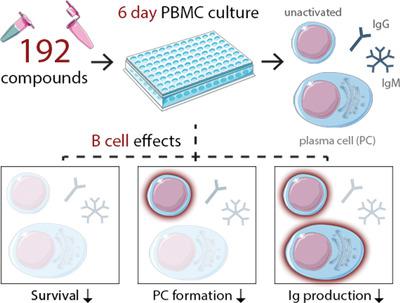当前位置:
X-MOL 学术
›
Eur. J. Immunol.
›
论文详情
Our official English website, www.x-mol.net, welcomes your
feedback! (Note: you will need to create a separate account there.)
High-throughput compound screen reveals mTOR inhibitors as potential therapeutics to reduce (auto)antibody production by human plasma cells.
European Journal of Immunology ( IF 4.5 ) Pub Date : 2019-11-14 , DOI: 10.1002/eji.201948241 Paul Tuijnenburg 1, 2 , Daan J Aan de Kerk 1, 2 , Machiel H Jansen 1, 2 , Ben Morris 3 , Cor Lieftink 3 , Roderick L Beijersbergen 3 , Ester M M van Leeuwen 2 , Taco W Kuijpers 1
European Journal of Immunology ( IF 4.5 ) Pub Date : 2019-11-14 , DOI: 10.1002/eji.201948241 Paul Tuijnenburg 1, 2 , Daan J Aan de Kerk 1, 2 , Machiel H Jansen 1, 2 , Ben Morris 3 , Cor Lieftink 3 , Roderick L Beijersbergen 3 , Ester M M van Leeuwen 2 , Taco W Kuijpers 1
Affiliation

|
Antibody production by the B cell compartment is a crucial part of the adaptive immune response. Dysregulated antibody production in the form of autoantibodies can cause autoimmune disease. To date, B-cell depletion with anti-CD20 antibodies is commonly applied in autoimmunity, but pre-existing plasma cells are not eliminated in this way. Alternative ways of more selective inhibition of antibody production would add to the treatment of these autoimmune diseases. To explore novel therapeutic targets in signaling pathways essential for plasmablast formation and/or immunoglobulin production, we performed a compound screen of almost 200 protein kinase inhibitors in a robust B-cell differentiation culture system. This study yielded 35 small cell-permeable compounds with a reproducible inhibitory effect on B-cell activation and plasmablast formation, among which was the clinically applied mammalian target of rapamycin (mTOR) inhibitor rapamycin. Two additional compounds targeting the phosphoinositide 3-kinase-AKT-mTOR pathway (BKM120 and WYE-354) did not affect proliferation and plasmablast formation, but specifically reduced the immunoglobulin production. With this compound screen we successfully applied a method to investigate therapeutic targets for B-cell differentiation and identified compounds in the phosphoinositide 3-kinase-AKT-mTOR pathway that could specifically inhibit immunoglobulin production only. These drugs may well be explored to be of value in current B-cell-depleting treatment regimens in autoimmune disorders.
中文翻译:

高通量化合物筛选揭示了mTOR抑制剂是减少人浆细胞产生(自身)抗体的潜在疗法。
B细胞区室产生的抗体是适应性免疫反应的关键部分。自身抗体形式的抗体生产失调会引起自身免疫性疾病。迄今为止,用抗CD20抗体清除B细胞常用于自身免疫,但不能以这种方式消除预先存在的浆细胞。更具选择性地抑制抗体产生的替代方法将增加对这些自身免疫性疾病的治疗。为了探索成浆细胞形成和/或免疫球蛋白产生所必需的信号传导途径中的新型治疗靶标,我们在强大的B细胞分化培养系统中进行了将近200种蛋白激酶抑制剂的复合筛选。这项研究产生了35种可渗透小细胞的化合物,这些化合物对B细胞的活化和成浆细胞的形成具有可再现的抑制作用,其中是雷帕霉素(mTOR)抑制剂雷帕霉素的临床应用哺乳动物靶标。靶向磷酸肌醇3-激酶-AKT-mTOR途径的另外两种化合物(BKM120和WYE-354)不影响增殖和成浆细胞形成,但特异性地降低了免疫球蛋白的产生。通过这种化合物筛选,我们成功地应用了一种方法来研究B细胞分化的治疗靶标,并在磷酸肌醇3-激酶-AKT-mTOR途径中鉴定了仅能特异性抑制免疫球蛋白产生的化合物。可以很好地探讨这些药物在当前自身免疫性疾病中的B细胞耗竭治疗方案中的价值。靶向磷酸肌醇3-激酶-AKT-mTOR途径的另外两种化合物(BKM120和WYE-354)不影响增殖和成浆细胞形成,但特异性地降低了免疫球蛋白的产生。通过这种化合物筛选,我们成功地应用了一种方法来研究B细胞分化的治疗靶标,并在磷酸肌醇3-激酶-AKT-mTOR途径中鉴定了仅能特异性抑制免疫球蛋白产生的化合物。可以很好地探讨这些药物在当前自身免疫性疾病中的B细胞耗竭治疗方案中的价值。靶向磷酸肌醇3-激酶-AKT-mTOR途径的另外两种化合物(BKM120和WYE-354)不影响增殖和成浆细胞形成,但特异性地降低了免疫球蛋白的产生。通过这种化合物筛选,我们成功地应用了一种方法来研究B细胞分化的治疗靶标,并在磷酸肌醇3-激酶-AKT-mTOR途径中鉴定了仅能特异性抑制免疫球蛋白产生的化合物。可以很好地探讨这些药物在当前自身免疫性疾病中的B细胞耗竭治疗方案中的价值。通过这种化合物筛选,我们成功地应用了一种方法来研究B细胞分化的治疗靶标,并在磷酸肌醇3-激酶-AKT-mTOR途径中鉴定了仅能特异性抑制免疫球蛋白产生的化合物。可以很好地探讨这些药物在当前自身免疫性疾病中的B细胞耗竭治疗方案中的价值。通过这种化合物筛选,我们成功地应用了一种方法来研究B细胞分化的治疗靶标,并在磷酸肌醇3-激酶-AKT-mTOR途径中鉴定了仅能特异性抑制免疫球蛋白产生的化合物。可以很好地探讨这些药物在当前自身免疫性疾病中的B细胞耗竭治疗方案中的价值。
更新日期:2019-11-14
中文翻译:

高通量化合物筛选揭示了mTOR抑制剂是减少人浆细胞产生(自身)抗体的潜在疗法。
B细胞区室产生的抗体是适应性免疫反应的关键部分。自身抗体形式的抗体生产失调会引起自身免疫性疾病。迄今为止,用抗CD20抗体清除B细胞常用于自身免疫,但不能以这种方式消除预先存在的浆细胞。更具选择性地抑制抗体产生的替代方法将增加对这些自身免疫性疾病的治疗。为了探索成浆细胞形成和/或免疫球蛋白产生所必需的信号传导途径中的新型治疗靶标,我们在强大的B细胞分化培养系统中进行了将近200种蛋白激酶抑制剂的复合筛选。这项研究产生了35种可渗透小细胞的化合物,这些化合物对B细胞的活化和成浆细胞的形成具有可再现的抑制作用,其中是雷帕霉素(mTOR)抑制剂雷帕霉素的临床应用哺乳动物靶标。靶向磷酸肌醇3-激酶-AKT-mTOR途径的另外两种化合物(BKM120和WYE-354)不影响增殖和成浆细胞形成,但特异性地降低了免疫球蛋白的产生。通过这种化合物筛选,我们成功地应用了一种方法来研究B细胞分化的治疗靶标,并在磷酸肌醇3-激酶-AKT-mTOR途径中鉴定了仅能特异性抑制免疫球蛋白产生的化合物。可以很好地探讨这些药物在当前自身免疫性疾病中的B细胞耗竭治疗方案中的价值。靶向磷酸肌醇3-激酶-AKT-mTOR途径的另外两种化合物(BKM120和WYE-354)不影响增殖和成浆细胞形成,但特异性地降低了免疫球蛋白的产生。通过这种化合物筛选,我们成功地应用了一种方法来研究B细胞分化的治疗靶标,并在磷酸肌醇3-激酶-AKT-mTOR途径中鉴定了仅能特异性抑制免疫球蛋白产生的化合物。可以很好地探讨这些药物在当前自身免疫性疾病中的B细胞耗竭治疗方案中的价值。靶向磷酸肌醇3-激酶-AKT-mTOR途径的另外两种化合物(BKM120和WYE-354)不影响增殖和成浆细胞形成,但特异性地降低了免疫球蛋白的产生。通过这种化合物筛选,我们成功地应用了一种方法来研究B细胞分化的治疗靶标,并在磷酸肌醇3-激酶-AKT-mTOR途径中鉴定了仅能特异性抑制免疫球蛋白产生的化合物。可以很好地探讨这些药物在当前自身免疫性疾病中的B细胞耗竭治疗方案中的价值。通过这种化合物筛选,我们成功地应用了一种方法来研究B细胞分化的治疗靶标,并在磷酸肌醇3-激酶-AKT-mTOR途径中鉴定了仅能特异性抑制免疫球蛋白产生的化合物。可以很好地探讨这些药物在当前自身免疫性疾病中的B细胞耗竭治疗方案中的价值。通过这种化合物筛选,我们成功地应用了一种方法来研究B细胞分化的治疗靶标,并在磷酸肌醇3-激酶-AKT-mTOR途径中鉴定了仅能特异性抑制免疫球蛋白产生的化合物。可以很好地探讨这些药物在当前自身免疫性疾病中的B细胞耗竭治疗方案中的价值。











































 京公网安备 11010802027423号
京公网安备 11010802027423号